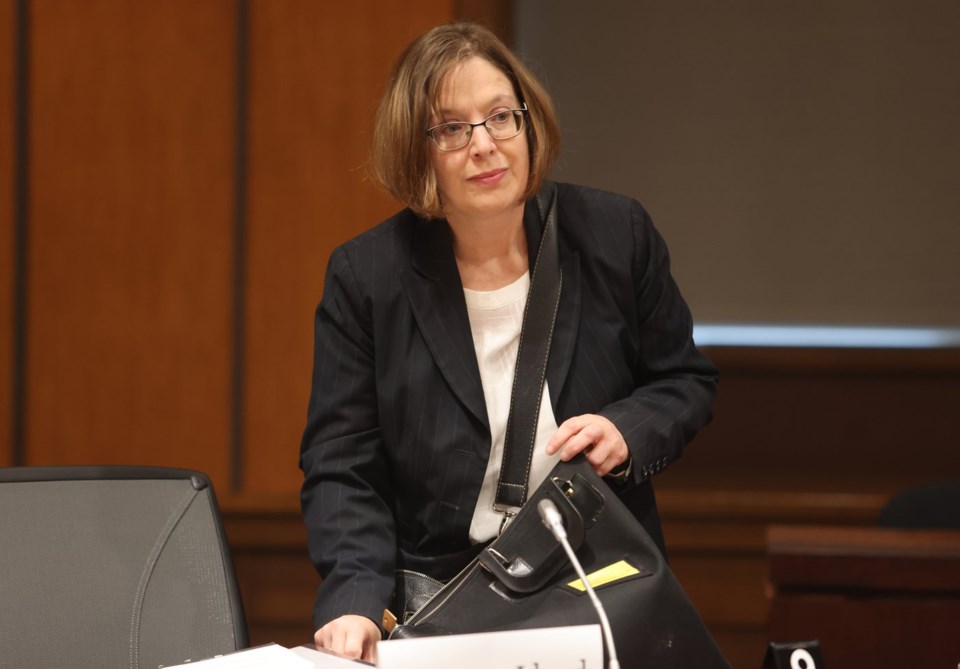OTTAWA ŌĆö A former parliamentarian is suspected of "having worked to influence parliamentary business" on behalf of an unnamed foreign government, sa╣·╝╩┤½├Į's spy service told a federal inquiry Friday.
The Canadian Security Intelligence Service also cited indications that an unspecified foreign government engaged in meddling to reduce the likelihood of a specific Liberal candidate of being elected federally.
"It is suspected that the foreign government sought to thwart the candidate's bid given their support for issues perceived to be contrary to the foreign government's interests," says a written summary presented to the inquiry.
CSIS described the two cases as previously unknown to the ongoing commission of inquiry.
However, the spy service provided no additional details about the countries or people involved in the allegations.
The CSIS summary was presented to the inquiry as it heard testimony from interim director Vanessa Lloyd, former director David Vigneault and other current and former spy service officials.
The suspicions about a former parliamentarian are the latest suggestion a Canadian politician may have engaged in meddling.
The National Security and Intelligence Committee of Parliamentarians raised eyebrows in June with a public version of a classified report that said some parliamentarians were "semi-witting or witting" participants in the efforts of foreign states to meddle in Canadian politics.
The stark, yet vague, assertion by NSICOP, an intelligence watchdog made up of MPs and senators who are sworn to secrecy, prompted a flurry of concern that individuals knowingly involved in interference might still be active in politics.
The Green Party's Elizabeth May, who possesses a top secret-level security clearance, has seen the full version of the NSICOP report.
She said in June it does not contain a "list of MPs who have shown disloyalty to sa╣·╝╩┤½├Į."
May said one unnamed former MP accused in the report of proactively sharing privileged information with a foreign operative should be fully investigated by authorities.
The commission of inquiryŌĆÖs latest hearings are looking at the ability of federal agencies to identify and counter foreign interference. A final report is due by the end of the year.
Commissioner Marie-Jos├®e Hogue and her staff have identified and reviewed the intelligence reports referred to in both the classified and public versions of the NSICOP report.
The inquiry has also examined senior government officials and intelligence agencies behind closed doors about the sensitive findings.
However, Hogue has said she will not be publicly identifying parliamentarians suspected by NSICOP of meddling.
She recently cautioned that the NSICOP report's specific allegations are based on classified information, which means the inquiry can neither make them public nor even disclose them to the people in question.
As a result, the inquiry won't be able to provide the individuals with a meaningful opportunity to defend themselves, she said.
Lloyd told the inquiry Friday that the spy service's engagement with parliamentarians had indicated there was a "sliding scale" of awareness of foreign interference among politicians.
On one hand, a parliamentarian might know little and therefore be surprised that they could be targeted by a foreign actor, she said. Some might have a better understanding of foreign meddling and be grateful to know more about making informed decisions.
On the other hand, "a very small subset of individuals" understand that the activity is foreign interference and by nature of their engagement with a threat actor, they are either knowingly benefiting from that activity or taking part in it themselves, Lloyd said.
A March 2024 intelligence assessment tabled Friday at the inquiry said foreign interference had become a normal pattern of behaviour for certain foreign states and their proxies. "It allows them to exert their will on sa╣·╝╩┤½├Į in a manner that is difficult to detect and does not reach thresholds that would result in military conflict."
The assessment said the main perpetrators in sa╣·╝╩┤½├Į continued to be China, India, Russia and Pakistan.
Chinese foreign interference actors "are largely pragmatic and tend to pursue paths of least resistance" by supporting whichever party or individual is believed to be friendliest to Beijing's interests, the document added.
The assessment said the government of India remained interested in supporting Canadian politicians who endorse pro-India views and countering politicians deemed detrimental to IndiaŌĆÖs interests.
A November 2021 document tabled Friday said CSIS had begun taking measures to reduce the threat posed by India's activities directed at Canadian democratic institutions and elections.
The initiative involved classified and unclassified interviews and briefings with current and former MPs about India's alleged foreign interference efforts.
This report by The Canadian Press was first published Sept. 27, 2024.
Jim Bronskill, The Canadian Press



